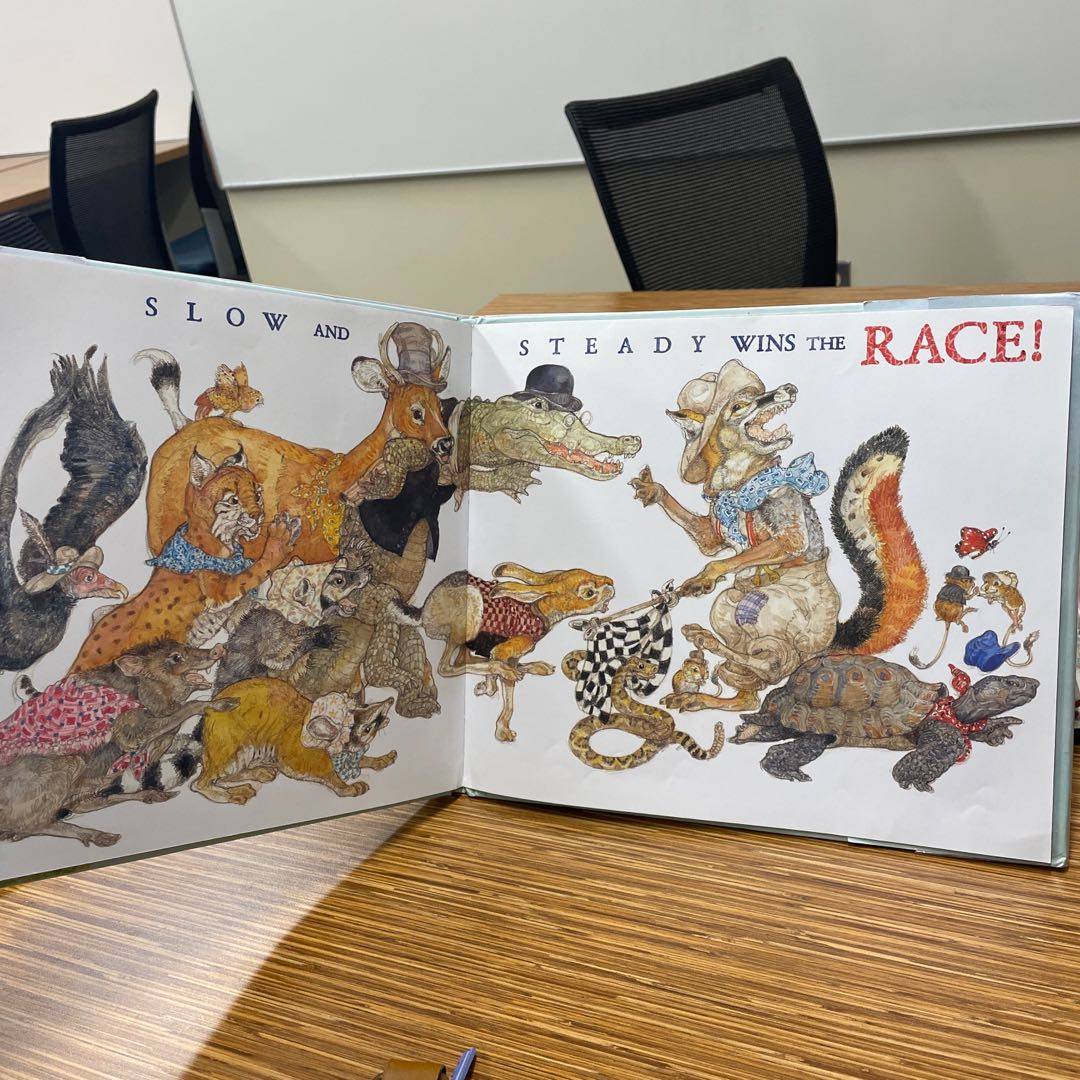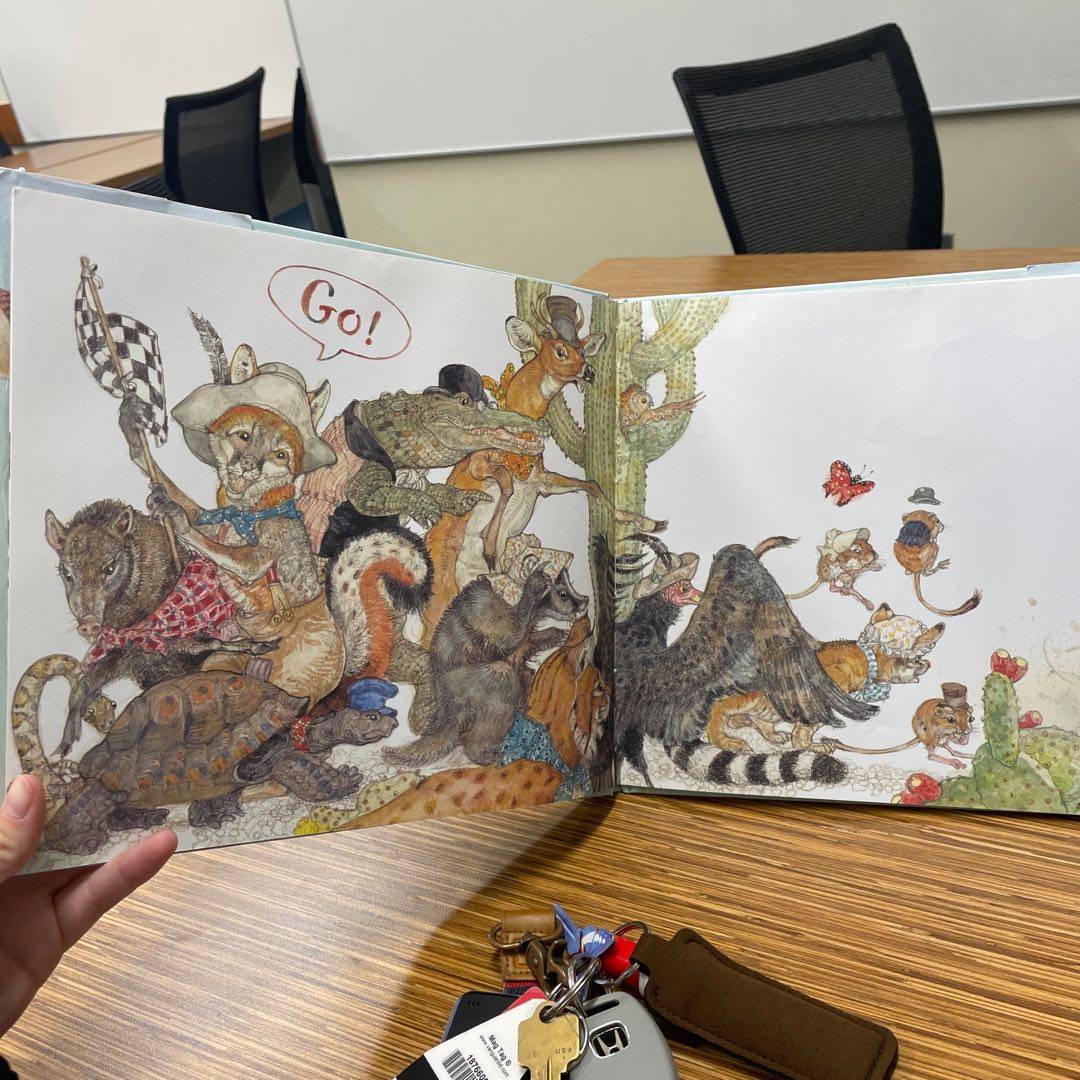“Slow and steady wins the race.”
I would use this fable in my classroom to teach students about the importance of taking their time while doing their work and kind of use it as a learning moment.
I would use this fable in my classroom to teach students about the importance of taking their time while doing their work and kind of use it as a learning moment.
This is a story that I clearly remember my mother reading to me as a child, so it was nice to reading it again. This is a story with a great message that transcends though time. I the illustrations in this copy were really good and I really enjoyed them.
Traditional literature
The artist, Jerry Pinkney, included an artist‘s note at the end of the book. In it, he shared his inspiration, his rationale for certain creative choices, and the mediums he used.
The illustrations are colorful, pattern-filled, and detailed, perfectly fitting the fable vibe. It's realistic but has a recognizable style in the water-coloring/sketchy combination look. It has very few words but does include dialogue and descriptors. I would use a different rendition with words to teach the moral behind the fable. However, if children are already familiar with this story I would include this version in my classroom.
I love how this author gets his story across with little to no words. He uses art to retell a story that's been told a million times. The way he presents the entire story of The Tortoise and the Hare with only 12 words is really impressive.
This is the traditional story of The Tortoise and The Hare but presented with only 12 words in the whole story. These are all the words needed to understand the message of “slow and steady wins the race.“ These are words we hear all the time, and this story could be looked at as the origination of this well-know phrase.
This is a good book to use during a morning meeting with young students (pre-k to 2nd grade) to show them the importance of taking their time on their work. It‘s easy to place value in being the first one done or the fastest, but being the fastest doesn‘t always mean you‘ll come in first.
Using his eye catching, beautiful illustrations and a few words, Jerry Pinkney tells the age old story of the tortoise and the hare. The story depicts what happens when a slow and steady turtle takes on a quick, but pompous hare in a foot race, teaching readers that it‘s good to take your time and that it‘s important not to be arrogant.
“Even the slowest tortoise can defeat the quickest hare, and even the proudest hare can learn a timeless lesson from the most humble tortoise: Slow and steady wins the race“
The Tortoise and the Hare is a fable for many reasons. One of the reasons is personification meaning the animals act how humans act. Another reason it is a fable is because of the moral of the story. All fables have a lesson learned or a moral and his story is a very well known one. Slow and steady wins the race and dont brag and be overconfident.
The Tortoise and the Hare is a classic tale that has been told many times in many different ways. This story has a lesson that people have been learning from forever. A tortoise and a hare decide to race. The hare has no doubt that he is going to win the race. The tortoise is calm and when they start the race the hare rushes off while the tortoise slowly moves. The hare is so far ahead he takes a nap. While the hare naps the tortoise wins.
“Even the slowest tortoise can defeat the quickest hare, and even the proudest hare can learn a timeless lesson from the most humble tortoise: Slow and steady wins the race!“
This story has an important message in the classroom. It can be used that going slow and steady can get you to the finish line. The tortoise got stuck up by going too fast and taking too many breaks. If you're more like the hare you will always make it to the finish line, even though you take more time to do so.
This is an iconic tale of a tortoise and a hare than decide to race with the overconfidence of the hare making him think this will be an easy race. The story has the hare take many breaks, including a nap, while the tortoise, while using their energy slowly, making their way to the finish line slow and steady. The tortoise wins by continuing through the whole race, even going slowly.
I enjoyed reading this specific retell and or depiction of this timely story. This is a story that I am well familiar with, as growing up I read and heard of many depictions of the story. I think this book could be well utilized in an elementary classroom. I believe having minimal words that it would allow children the opportunity to use their background knowledge as well as inferring skills in order to construct a well written storyline.
This story is an example of a fable which is a specific type of traditional literature. This depiction of the classic story uses minimal words to portray the meaningful message to its readers. The message being that “slow and steady wins the race.“ This is encouragement to all individuals that even when we think the odds are against us, we must not underestimate our true abilities. That if we work hard and never give up, we will succeed.
The moment when the Tortoise wins the race is a huge moment that readers realize that is it not always about being the fastest to the finish line but taking your time to get there and enjoying your time along the way.
This story is a fable. This story is a life lesson about taking things slow and steady. During the story the Hare gets a little ahead of himself thinking he can out run the Tortoise and easily win the race but then the Hare stops for a short rest. By the time the Hare wakes up the Tortoise has passed him and is getting ready to pass the finish line.
“Even the slowest tortoise can defeat the quickest hare, and even the proudest hare can learn a timeless lesson from the most humble tortoise: Slow and steady wins the race!“
I would use this book in my classroom to teach children about the importance of not giving up. This book is an encouragement to all of us who think that we are not too good at something. We must not underestimate ourselves. If we work hard and don't give up, we will succeed
The type of literature used in this story is fable. A fable is a fictitious story, usually with animals as characters, that relays a moral or lesson at the end. The story is about about a cocky Hare and a slow moving Tortoise that challenge each other to a race.
Blurb:
I can use this book to teach my class about taking their time and doing work the right way. Also, that boasting is not okay. The illustrations are amazing too! The colors and textures are what make the illustrations amazing.
Review:
This is an example of a fable because it teaches a lesson/moral. The moral of the story is slow and steady wins the race. It is important to take your time and do things right.
Traditional. This classic story of the tortoise and the hare is told though beautiful pictures that depict the action and moral of the story. Slow and steady wins the race and don't get to greedy just because you think something is going to be easy it might bite you in the butt.
Tortoise and the hare published In 2014 was a very easy read especially for introducing fairytales to children! It‘s easy to tell the story with the amazing illustrations.
One of the most popular children‘s books (probably the only one I have memorized as I‘ve heard it many times). The tortoise and the hare is a story about perseverance and finding strength in ourselves, as the slow, humble tortoise defeats the quickest hare.
This book was published in 2013. The illustrations are colorful and very precise. They are easy to look at. This book is always a good one to read because it brings such a good lesson to children and in life in general.
This is a classic tale that teaches a valuable lesson. This book will draw readers in because of its use of animals and competition. Never judge a book by its cover.
The Tortoise and the Hare by Jerry Pinckney is a Caldecott Medalist book. (2013). This book have wonderful illustrations and teaches a good lesson about slow and steady wins the race!

Slow and steady wins the race, the famous line told for centuries. Almost anyone can trace this quote back to this story. Thats how children literature captivates yours mind!

There is not a-lot of dialogue but the water color pictures are just adorable!